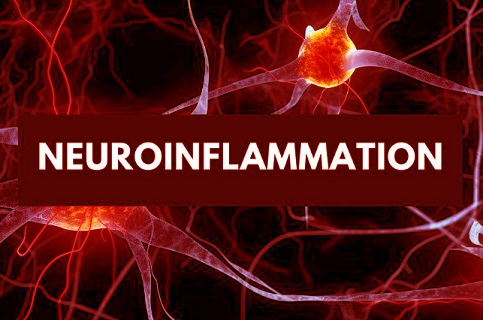Nikhil Prasad Fact checked by:Thailand Medical News Team Dec 30, 2024 1 year, 1 month, 3 days, 12 hours, 50 minutes ago
Medical News: Neuroinflammation, a complex biological response in the brain and central nervous system (CNS), plays a pivotal role in many neurological disorders. It is triggered by injuries, infections, or diseases that disturb the brain's balance. While acute neuroinflammation can help the brain recover, chronic neuroinflammation has been linked to severe neurodegenerative diseases such as Alzheimer’s disease, Parkinson’s disease, and Multiple Sclerosis. Researchers from Chosun University’s Immunology Research Lab & BK21-Four Educational Research Group for Age-Associated Disorder Control Technology in South Korea, led by Mi Eun Kim and Jun Sik Lee, have been delving into the intricacies of this condition. This
Medical News report explores their findings and the promising pathways for therapeutic interventions.
 Neuroinflammation and New Strategies for Brain Health
Unraveling Neuroinflammation: The Cellular Landscape
Neuroinflammation and New Strategies for Brain Health
Unraveling Neuroinflammation: The Cellular Landscape
At the heart of neuroinflammation are the cells of the CNS, including microglia, astrocytes, and peripheral immune cells, each playing distinct roles. Microglia, the brain’s resident immune cells, actively monitor the environment for any disturbances. When triggered by harmful agents such as amyloid beta plaques in Alzheimer’s disease or alpha-synuclein aggregates in Parkinson’s disease, they transition into an activated state. These states can be either pro-inflammatory, releasing harmful molecules like TNF-α and IL-6, or anti-inflammatory, promoting healing through cytokines like IL-10. A sustained imbalance, however, fuels chronic inflammation and neuronal damage.
Astrocytes, abundant support cells in the brain, also play a significant role. When activated, they produce cytokines and chemokines that can either protect or harm neurons. Their interaction with microglia forms a feedback loop, often exacerbating neuroinflammatory conditions. Peripheral immune cells, such as T cells and macrophages, infiltrate the brain during blood-brain barrier disruptions, further intensifying the inflammatory response.
The Molecular Orchestration of Neuroinflammation
The signaling pathways driving neuroinflammation reveal the complexity of this biological process. Key players include:
-NF-κB Pathway: This major regulator amplifies inflammation by triggering the release of cytokines and chemokines in response to damage. Overactivation in conditions like Alzheimer’s disease accelerates neuronal damage.
-JAK-STAT Pathway: Activated by cytokines, this pathway is linked to the production of neurotoxic astrocytes. Drugs like Ruxolitinib are being explored to inhibit its detrimental effects.
-NLRP3 Inflammasome: This protein complex activates inflammatory cytokines IL-1β and IL-18. It plays a central role in neurodegenerative diseases by escalating inflammation in the presence of amyloid plaques.
gt;-MAPK Signaling: This pathway influences microglial and astrocytic responses, with aberrant activation contributing to chronic inflammation in Alzheimer’s and Parkinson’s diseases.
Emerging Regulators and Innovative Perspectives
Recent studies highlight novel factors influencing neuroinflammation:
-Non-Coding RNAs: Molecules like miR-155 and miR-146a regulate inflammation at the genetic level. miR-155 exacerbates inflammation, while miR-146a mitigates it, making them promising therapeutic targets.
-Epigenetic Modifications: DNA methylation and histone alterations influence gene expression in neuroinflammation. Drugs targeting these modifications are under investigation to restore balance.
-Gut-Brain Axis: The microbiota’s role in brain health is gaining attention. Dysbiosis, or microbial imbalance, has been linked to Parkinson’s disease, where gut-derived alpha-synuclein aggregates travel to the brain, triggering inflammation.
-Metabolic States: Immune cells’ metabolic profiles shift during neuroinflammation. Microglia adopt glycolysis in pro-inflammatory states, while oxidative phosphorylation supports anti-inflammatory functions. Modulating these metabolic pathways is a novel therapeutic avenue.
Therapies and Interventions
The researchers outline a range of strategies to combat neuroinflammation, balancing its protective and harmful roles:
-Traditional Anti-Inflammatory Drugs: NSAIDs like ibuprofen and corticosteroids remain the mainstay but have limitations due to systemic side effects and poor blood-brain barrier penetration.
-Targeted Immunomodulators: Anti-TNF therapies and IL-6 inhibitors show promise in regulating CNS inflammation, though their delivery challenges persist.
-Gene and RNA Therapies: Technologies such as RNA interference and CRISPR-Cas9 offer precision in targeting inflammatory mediators. Antisense oligonucleotides (ASOs) like Nusinersen have already revolutionized CNS treatments.
-Stem Cell Therapies: Mesenchymal and induced pluripotent stem cells not only modulate inflammation but also aid in neural repair. However, their long-term safety and scalability require further research.
Conclusions and Future Directions
The findings emphasize that neuroinflammation is both a cause and consequence of neurodegeneration, creating a vicious cycle that demands multifaceted interventions. Addressing cellular and molecular mechanisms provides opportunities to develop therapies that not only curb inflammation but also promote recovery. Collaborative efforts integrating anti-inflammatory drugs, gene-based treatments, and stem cell therapies hold potential for breakthroughs. Future research should focus on personalizing these strategies to patient-specific needs and ensuring their translation from labs to clinics.
The study findings were published in the peer-reviewed journal: Current Issues in Molecular Biology.
https://www.mdpi.com/1467-3045/47/1/8
For the latest on Neuroinflammation, keep on logging to Thailand Medical News.
Read Also:
https://www.thailandmedical.news/news/the-phytochemical-honokiol-from-the-magnolia-tree-combats-neuroinflammation-and-brain-aging
https://www.thailandmedical.news/news/study-finds-that-mpox-virus-infects-human-astrocytes-causing-neuroinflammation-and-eventual-brain-damage
https://www.thailandmedical.news/news/covid-19-causes-the-upregulation-of-neuroinflammation-associated-genes-in-the-brain
https://www.thailandmedical.news/news/herbs-and-phytochemicals-french-study-shows-apigenin-s-potential-in-preventing-and-treating-neuroinflammation
https://www.thailandmedical.news/news/the-role-of-mast-cells-in-sars-cov-2-induced-neuroinflammation
https://www.thailandmedical.news/news/herbs-and-phytochemicals-agathisflavone-from-catingueira-has-anti-inflammatory-effect-on-activated-microglia-in-neuroinflammation-and-alzheimer
https://www.thailandmedical.news/news/covid-19-news-chronic-neuroinflammation-and-the-enigma-of-brain-fade-syndrome-in-neurological-diseases
https://www.thailandmedical.news/news/illinois-study-finds-that-caveolin-1-mediates-blood-brain-barrier-permeability-neuroinflammation-and-cognitive-impairment-in-covid-19
https://www.thailandmedical.news/news/covid-19-news-immune-dysfunction-altered-immune-metabolism-dysbiosis-neuroinflammation-and-viral-persistence-are-issues-causing-long-covid
